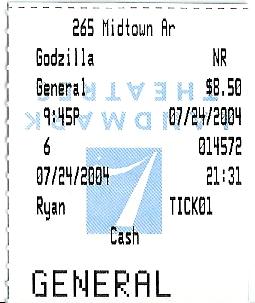27 July 2004
Review: Gojira (3/5)

This was the original Japanese version with no Americans spliced in (those Americans being Raymond Burr) and with English subtitles. Even considering the added distraction during action scenes, or with dodging tall people in front of me, I prefer subtitles over dubbing for the added naturalism. It's like hearing Haydn on authentic instruments: you may not as readily connect with what's going on without the benefit of sounds you're used to, but the authenticity adds to the experience. And although I know I'd seen the American version of Godzilla at some point in my life, the time that had passed and the notable differences with the original made this a new experience.
The opening titles were stark, and throughout the movie was often somber. Scenes of Godzilla in black and white against a blurred, burning set were effective and cleanly stylish. At times, you accepted the rubber suit and toy Tokyo as the rough charcoal sketches they were. Placed against the incessant main theme stolen from some lost Shostakovich symphony, the fears of 1954 Japan were well realized.
But fifty years can wear on a movie. While the special effects were forgivably dated, and even looked good for what they were, the acting didn't hold up as well. It was at times very melodramatic, and the writing continually emphasized that man must struggle with the destructive power he wields. Remembering what happened only nine years earlier, we can't diminish the movie too much for its melodrama. Also, consider that the American version removed references to Hiroshima and Nagasaki--what is melodrama now was both plaintive and painful depending on the viewpoint.
Issues of dated material aside, there were some interesting scenes that stuck with me. In an early one, a government committee was debating whether to disclose the nature of the threat to the public. The button-down officials where adamant, but a group of women (reporters? committee members?) incited a brouhaha over keeping the public informed. They insisted that open information was the best defense that the government could give its people.
I'll let that sit there.
In another scene, reporters watched from a radio tower as Godzilla decimated the city. They could see each district as he was approaching, and broadcast the warnings live. Eventually, Godzilla spotted them and they had to broadcast their own destruction. "He's coming right at us! There's no way to escape now, so we'll just continue reporting..." It was some unexpected black humor, but may have had more vehement intentions in its day.
The ultimate struggle in the movie was whether man had the right to use a devastating weapon against his foe. The weapon they had would kill Godzilla but would also kill all sea-life in the waters around Japan. In the end, the scientists accepted that when threatened with destruction, they had no choice but to use the devastating weapon--in effect acknowledging the moral difficulty of the Hiroshima and Nagasaki issue.
There was much to make fun of, but also much to enjoy if you approach it with the right attitude. Older movies often have a distance, genre movies more so, but who can resist the king of the monsters?
-> IMDB
- The music and the cinema and the theater posted by sstrader on 13 July 2016 at 8:33:57 PM
- Race, actors, representation posted by sstrader on 22 January 2016 at 5:29:53 PM
- Where was I? posted by sstrader on 9 January 2016 at 10:35:51 AM
- Three Jess Franco films posted by sstrader on 7 November 2015 at 8:44:34 AM
- Notes on We Don't Care About Music Anyway posted by sstrader on 7 June 2015 at 1:06:34 PM